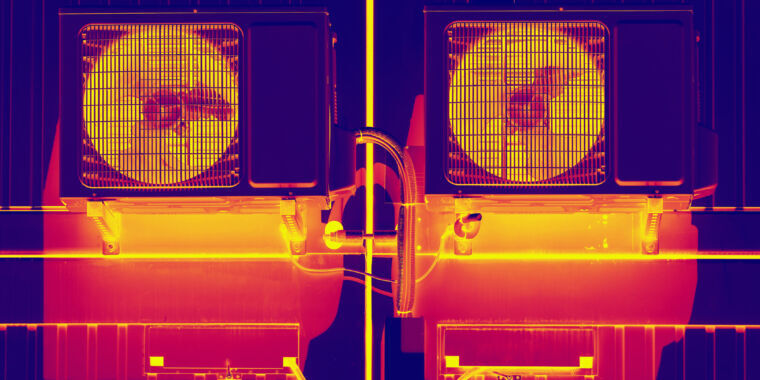Nine states are teaming up to accelerate adoption of this climate-friendly device.
Death is coming for the old-school gas furnace—and its killer is the humble heat pump. They’re already outselling gas furnaces in the US, and now a coalition of states has signed an agreement to supercharge the gas-to-electric transition by making it as cheap and easy as possible for their residents to switch.
Nine states have signed a memorandum of understanding that says that heat pumps should make up at least 65 percent of residential heating, air conditioning, and water-heating shipments by 2030. (“Shipments” here means systems manufactured, a proxy for how many are actually sold.) By 2040, these states—California, Colorado, Maine, Maryland, Massachusetts, New Jersey, New York, Oregon, and Rhode Island—are aiming for 90 percent of those shipments to be heat pumps.
“It’s a really strong signal from states that they’re committed to accelerating this transition to zero-emissions residential buildings,” says Emily Levin, senior policy adviser at the Northeast States for Coordinated Air Use Management (NESCAUM), an association of air-quality agencies that facilitated the agreement. The states will collaborate, for instance, in pursuing federal funding, developing standards for the rollout of heat pumps, and laying out an overarching plan “with priority actions to support widespread electrification of residential buildings.”



What a useless “feel good about us doing something” memorandum of understanding. Everyone is already heading this way and will hit the mark with no state assistance at all.
A/C+heatpump systems are already way cheaper to use than gas heaters. Doubly so as more and more people are getting solar. No one but rich people wanting to feel warm air from vents are still installing gas heaters.
A family member in rural MA talked to three different HVAC installers about converting from gas to heat pumps. All of them suggested leaving the gas system as backup for the coldest months for financial reasons, despite the MassSave whole house heat pump conversion $10k rebate. So, more legislative pressure would definitely still be a help to counter entrenched fossil fuel preference.
Like you said “keep as a backup”. In areas that get cold, you can’t just use a heat pump. Residential heat pumps are only good to about 20 to 25f. Once it gets colder than that you have to have a gas or an electric backup, and at that stage electric is less efficient than gas. So why install an electric backup system (coils that get hot in your blower unit) when you already have gas in place and set up? Running the electric backup coils like I have set up in my all electric house with heat pump uses a large amount of electricity when I have to use it. I have a heat pump that’s a bit older (2007), so it stops warming closer to 30 degrees.
Large scale commercial units (like 14 ton units, where residential is usually around 3.5 ton) can do more. Even down to around -3 f, but not residential, and where I’m at it sometimes get below those temps as well.
Our heat pump (Mitsubishi H2Hi) did fine regularly in single digits F last winter. I know there’s a limit (for efficiency more than function) but it’s definitely getting lower. We had one day -10F or so and no pipes froze (we were actually out of town which was nerve wracking so I don’t know if the house got colder than the thermostat requested).
We had 3 days of -10 to 0 ish in Colorado over MLK Jr weekend, my H2i kept 68F in the house no problem. It dropped to 67 a few times during defrost cycles, since I have no backup. It works great, im sure your house did just fine unless is severely undersized.
That was true a couple decades ago, but hasn’t really been true in a while.
A combination of inverters, variable speed compressors, vapor injection, and using slightly different refrigerants means there’s a number of cold climate heat pumps on the market that will heat down below -13°F.